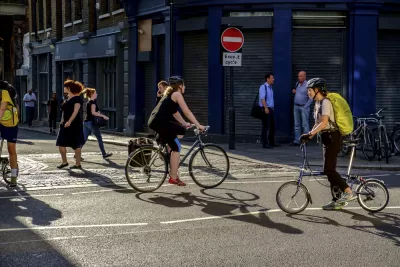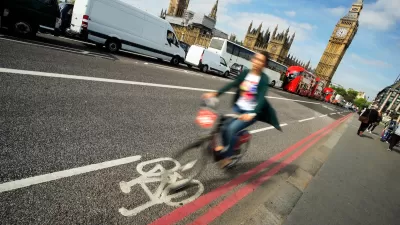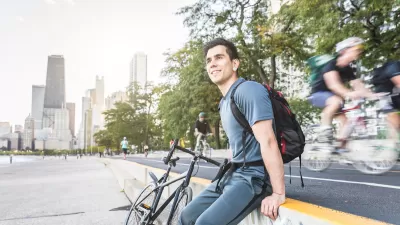A new study outlines the potential economic, environmental, and public health benefits of increasing cycling mode share in London, which has pledged to achieve net-zero emissions by 2030.

According to a report from Transport for the Quality of Life, tripling bicycle mode share in London would "save lives, create jobs and result in an annual economic dividend of $6.5 billion," in addition to environmental benefits and traffic reduction, writes Carlton Reid.
A TfL analysis from 2016 suggested that 3.1 million daily car driver trips and 1.6 million car passenger trips in London could be switched to cycling or walking. More than half of these trips are less than 3 kilometers in length, and it is often far quicker to cycle than to drive in Central London where motoring speeds have barely increased since the days of the horse and cart.
The city has pledged to reach net-zero emissions by 2030, and boosting bicycling could help achieve that goal and create economic benefits. "Investment in cycleways was one of the best ways of creating jobs through infrastructure spend, more than any other infrastructure project aside from energy efficiency in buildings, reported the TUC’s 2020 study." But without additional funding, London's transportation system will have to make service cuts and end investment in active travel projects, says another report prepared for Transport for London's finance committee.
The report estimates that with robust government support and investment in infrastructure, cycling mode share could grow from 2 percent to 14 percent of trips by 2030.
FULL STORY: Tripling Bicycle Use Would Pump $6.5 Billion Into London’s Economy Each Year, Says Report

Planetizen Federal Action Tracker
A weekly monitor of how Trump’s orders and actions are impacting planners and planning in America.

Maui's Vacation Rental Debate Turns Ugly
Verbal attacks, misinformation campaigns and fistfights plague a high-stakes debate to convert thousands of vacation rentals into long-term housing.

San Francisco Suspends Traffic Calming Amidst Record Deaths
Citing “a challenging fiscal landscape,” the city will cease the program on the heels of 42 traffic deaths, including 24 pedestrians.

Defunct Pittsburgh Power Plant to Become Residential Tower
A decommissioned steam heat plant will be redeveloped into almost 100 affordable housing units.

Trump Prompts Restructuring of Transportation Research Board in “Unprecedented Overreach”
The TRB has eliminated more than half of its committees including those focused on climate, equity, and cities.

Amtrak Rolls Out New Orleans to Alabama “Mardi Gras” Train
The new service will operate morning and evening departures between Mobile and New Orleans.
Urban Design for Planners 1: Software Tools
This six-course series explores essential urban design concepts using open source software and equips planners with the tools they need to participate fully in the urban design process.
Planning for Universal Design
Learn the tools for implementing Universal Design in planning regulations.
Heyer Gruel & Associates PA
JM Goldson LLC
Custer County Colorado
City of Camden Redevelopment Agency
City of Astoria
Transportation Research & Education Center (TREC) at Portland State University
Jefferson Parish Government
Camden Redevelopment Agency
City of Claremont





























